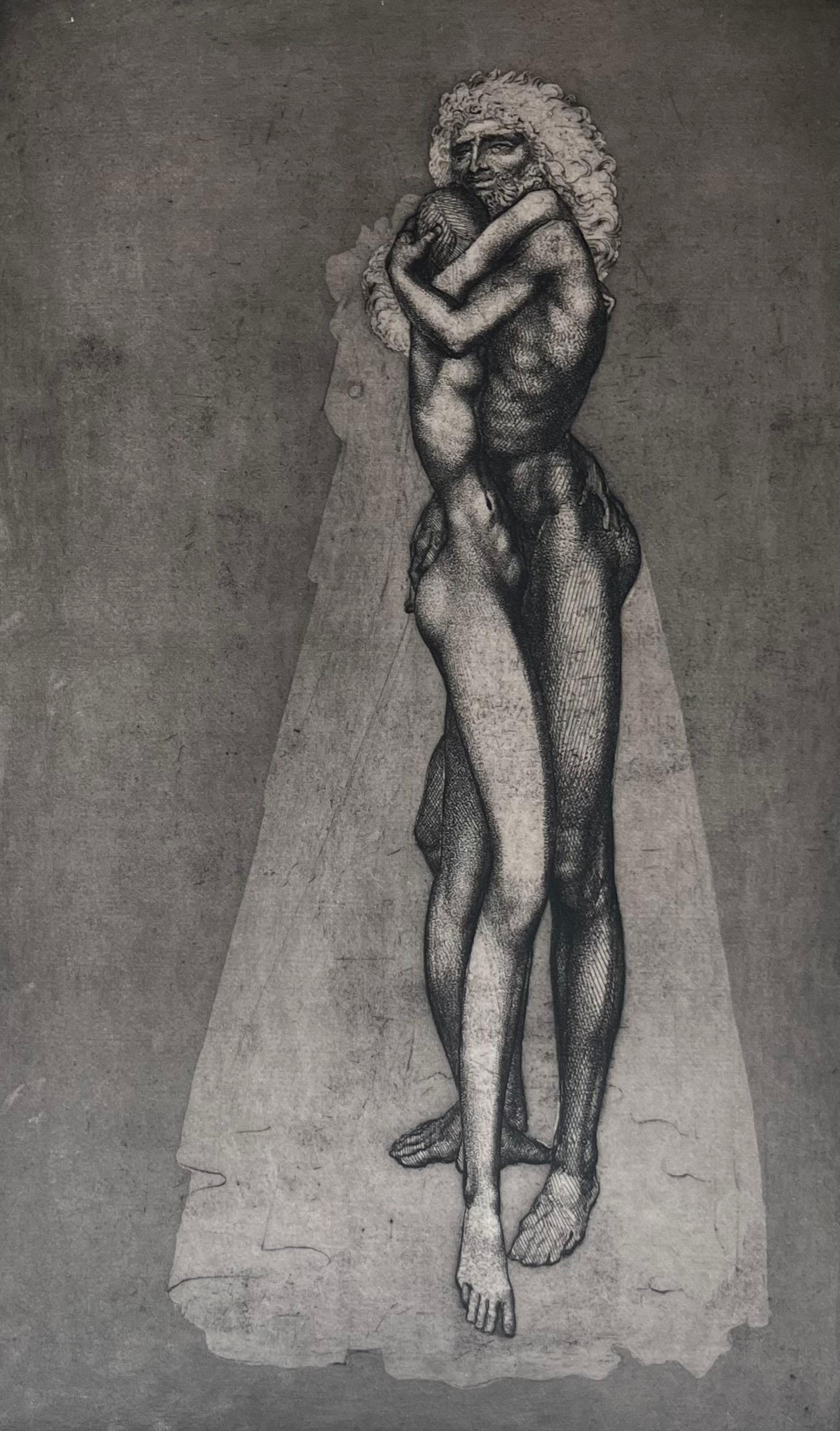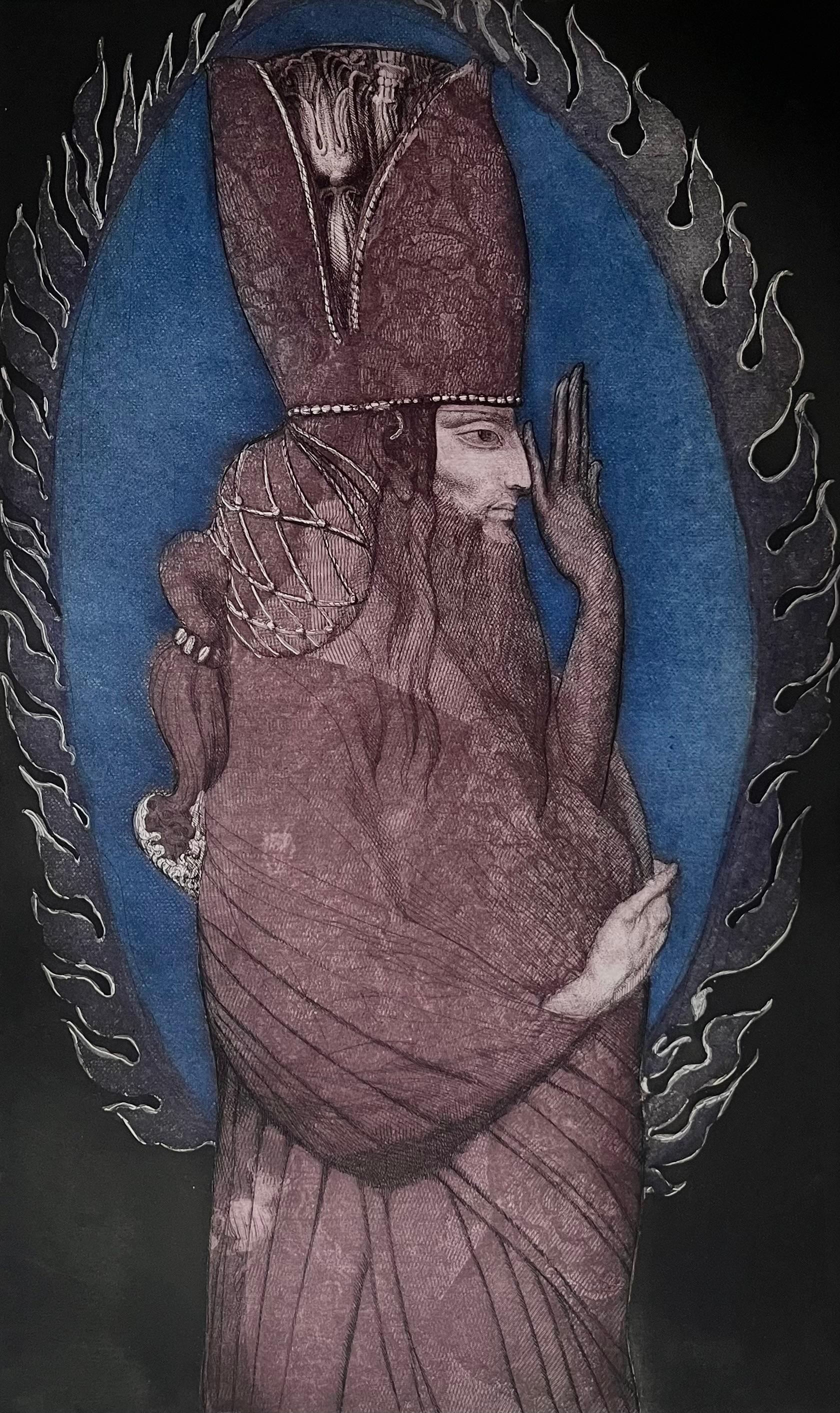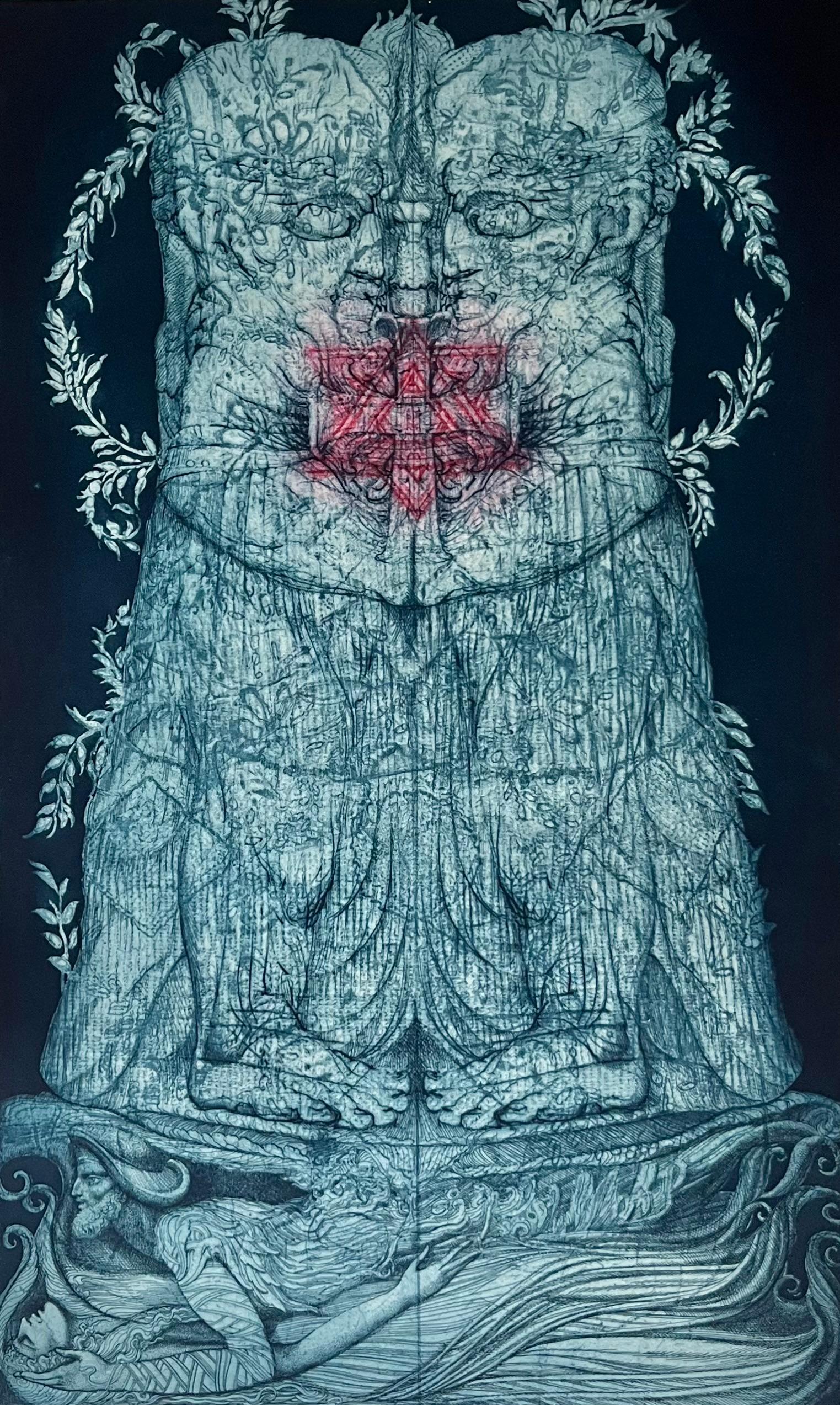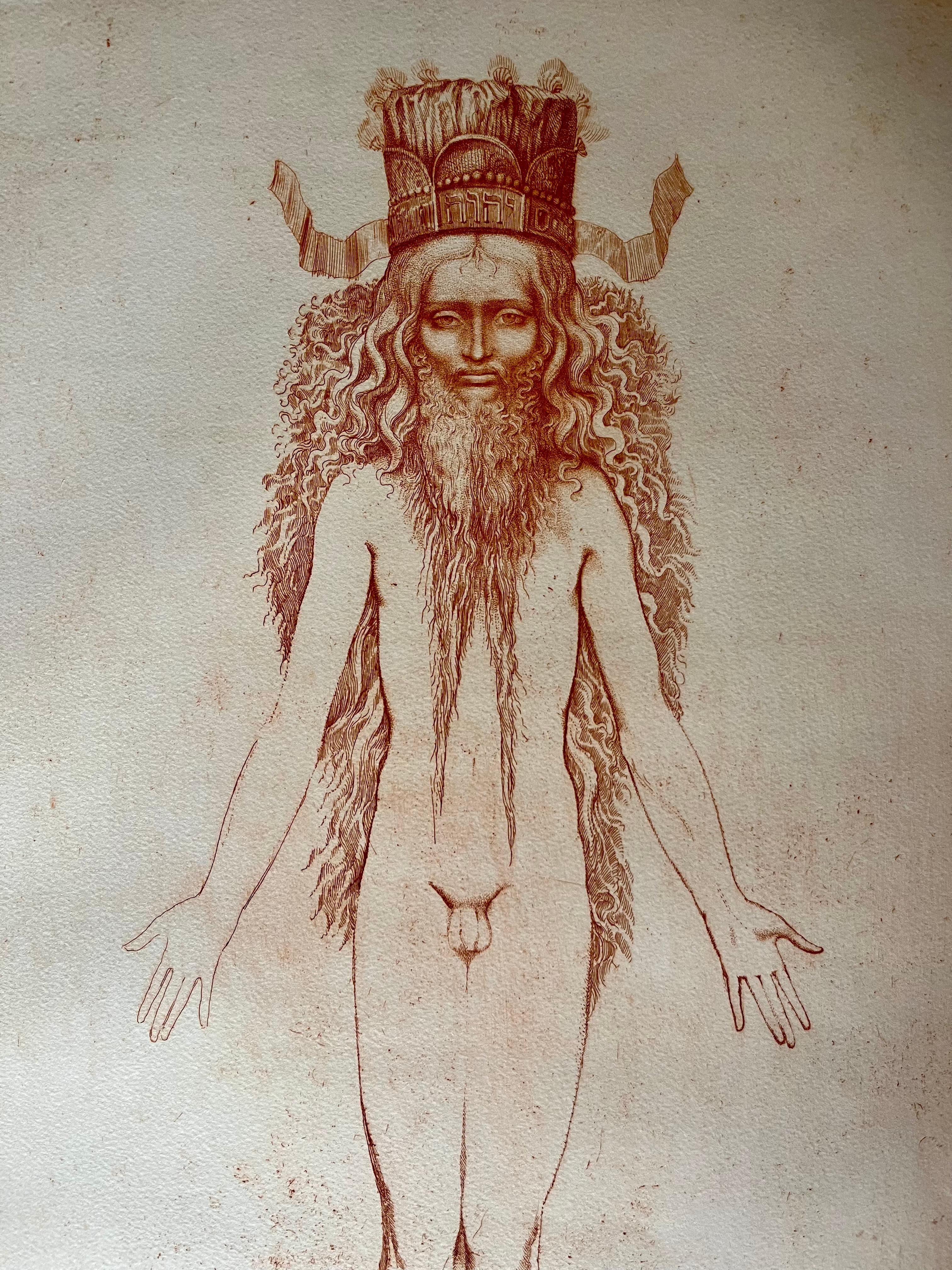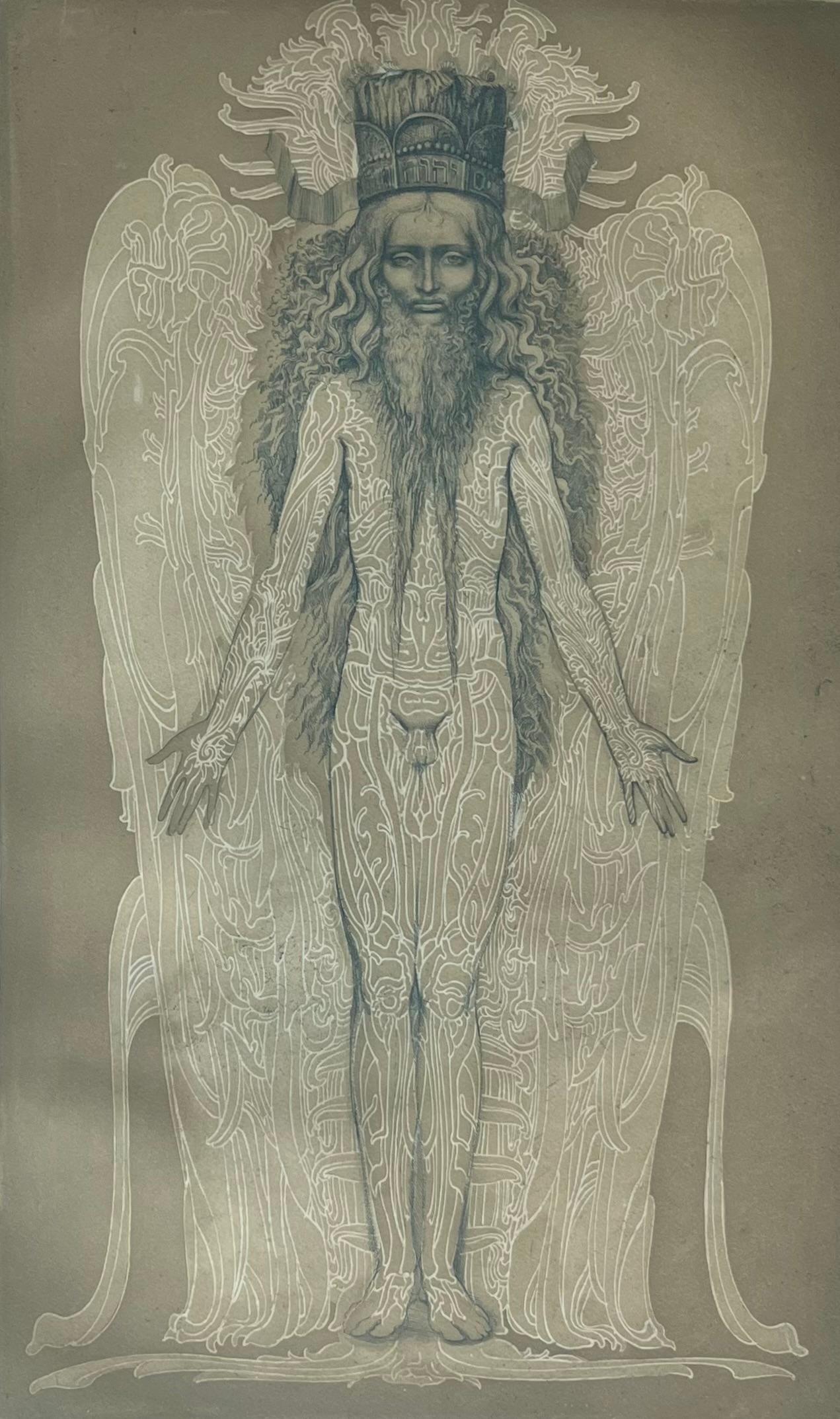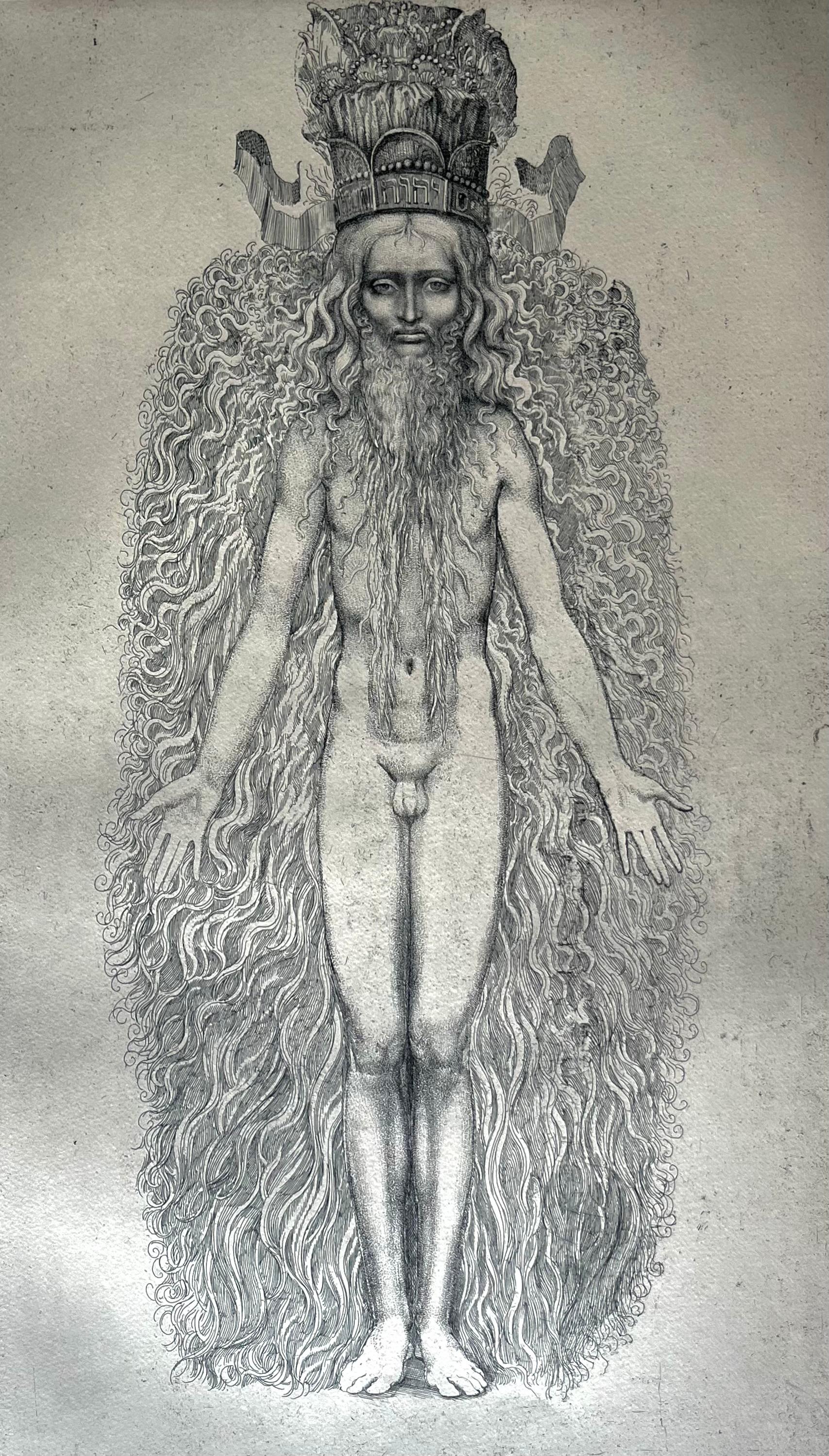Items Similar to Africa - Etching by Mino Trafeli - 1969
Want more images or videos?
Request additional images or videos from the seller
1 of 6
Mino TrafeliAfrica - Etching by Mino Trafeli - 19691969
1969
About the Item
Etching, numbered and signed, by the Italian artist Mino Trafeli (Volterra, Italy 1922-2018).
His path is a continuous reflection on the work of art (object, sculpture, assembly), which led him to experiment with every form of artistic expression and every means available to achieve it: thus, over the years, the activity of sculptor and painter have gone side by side the intense graphic production, the use of photography, video and the stage.
- Creator:Mino Trafeli
- Creation Year:1969
- Dimensions:Height: 27.56 in (70 cm)Width: 19.69 in (50 cm)Depth: 0.04 in (1 mm)
- Medium:
- Movement & Style:
- Period:
- Framing:Framing Options Available
- Condition:Insurance may be requested by customers as additional service, contact us for more information.
- Gallery Location:Roma, IT
- Reference Number:
About the Seller
4.9
Platinum Seller
These expertly vetted sellers are 1stDibs' most experienced sellers and are rated highest by our customers.
1stDibs seller since 2017
6,726 sales on 1stDibs
Typical response time: 2 hours
- ShippingRetrieving quote...Ships From: Rome, Italy
- Return PolicyA return for this item may be initiated within 14 days of delivery.
More From This SellerView All
- La Philosophie dans le Boudoir - Etching by Hans Bellmer - 1968By Hans BellmerLocated in Roma, ITThis beautiful artwork is hand-signed. It comes from the Portfolio "Petit Traité de Morale", Paris, Editions Georges Visat, 1968. Copy on Velin d'Arches. Includes matting. Hans Bel...Category
1960s Modern Figurative Prints
MaterialsEtching, Paper
- Les Infortunes de la Vertu - Etching by Hans Bellmer - 1968By Hans BellmerLocated in Roma, ITHand Signed. From the Portfolio "Petit Traité de Morale", Paris, Editions Georges Visat, 1968. Copy on Japon Nacré from the additional suite. Includes matting. Hans Bellmer was a G...Category
1960s Modern Figurative Prints
MaterialsEtching, Paper
- Figures - Drypoint by Mino Maccari - Mid-20th CenturyBy Mino MaccariLocated in Roma, ITMid-20th Century. Hand-signed in the lower right part. Numbered. Edition 1/12. Good conditions. Mino Maccari (Siena, 1924-Rome, June 16, 1989) was an Italian writer, painter, engraver and journalist, winner of the Feltrinelli Prize for Painting in 1963 and first winner of the Forte dei Marmi Satira Prize in 1973.After completing his secondary education, he enrolls in university. An interventionist like many young people of his time, he took part in the Great War at the age of nineteen as a field artillery officer. At the end of the conflict he resumed his university studies in Siena and in 1920 he graduated in law. In 1924 he was called by Angiolo Bencini to take care of the printing of the magazine Il Selvaggio, openly uncompromising fascist, revolutionary and anti-bourgeois, where his first engravings were published. After a few years of coexistence between work at the newspaper and the law firm, at the beginning of 1926 he left the legal profession to take over the direction of Il Selvaggio which he would hold until 1942. In 1928 he was the author of the small book published by Vallecchi (Florence), Il Trastullo di Strapaese (little songs and engraved woodwinds) which collected fascist songs (the same book was seized several times from Antonio Gramsci during his detention). With the transfer of the editorial staff of the Selvaggio in 1925 from Colle di Val d'Elsa to Florence, Maccari collaborated with Ardengo Soffici, Ottone Rosai and Achille Lega. In the meantime, between 1927 and 1930, he made himself known to the general public as a painter by participating in various national exhibitions. Also in 1930 Maccari works in Turin at La Stampa as editor-in-chief and has the writer Curzio Malaparte as director. His presence in the cultural and editorial world of the fascist regime is very intense, he writes and collaborates with various magazines: Quadrivio, L'Italia Letteraria, L'Italiano and Omnibus by Leo Longanesi; then, during the war, in il Primato di Bottai and, subsequently again, in Il Mondo di Pannunzio (from the first number, in 1949), up to Documento by Federigo Valli. His graphic production is also vast, ranging from the Album of Vallecchi (1925), Il trastullo di Strapaese (1928) to Linoleum (1931). Maccari illustrated in 1934 La vecchia del Bal Bullier by Antonio Baldini and in 1942 he published the Album folder, followed by Come quando fuori Piove and Il superfluo illustrata.For his pictorial work full of evident chromatic accentuations and fast brushstrokes, the violent drawing combined with the lively stroke of the graphic sign of his engravings, he is recognized by critics as a complete artist. In 1962 he was also entrusted with the presidency of the Accademia di San Luca in Rome and managed to obtain a personal exhibition at Gallery 63 in New York. His production of drawings, watercolors, temperas, etc. is endless, sometimes in collaboration with prestigious publishing houses; it is worth mentioning, just as an excellent example, the 32 b/w and color drawings with which he illustrated Il gusto di vivere, a volume that collects writings by Giancarlo Fusco, edited by Natalia Aspesi and published by Laterza in 1985. Maccari, Sienese and great contradaiolo della Torre, painted the Palio...Category
Mid-20th Century Modern Figurative Prints
MaterialsPaper, Drypoint, Etching
- Figures - Drypoint by Mino Maccari - Mid-20th CenturyBy Mino MaccariLocated in Roma, ITFigures is an Etching and Drypoint realized by Mino Maccari in the Mid-20th Century. Hand-signed in the lower right part. Good conditions. Mino Maccari (Siena, 1924-Rome, June ...Category
Mid-20th Century Modern Figurative Prints
MaterialsPaper, Drypoint, Etching
- Nude - Etching by Mino Maccari - Mid-20th CenturyBy Mino MaccariLocated in Roma, ITNude is an Etching realized by Mino Maccari in the Mid-20th Century. Hand-signed in the lower right part. Artist'proof. Good conditions. Mino Maccari (Siena, 1924-Rome, June 16, 1989) was an Italian writer, painter, engraver and journalist, winner of the Feltrinelli Prize for Painting in 1963 and first winner of the Forte dei Marmi Satira Prize in 1973.After completing his secondary education, he enrolls in university. An interventionist like many young people of his time, he took part in the Great War at the age of nineteen as a field artillery officer. At the end of the conflict he resumed his university studies in Siena and in 1920 he graduated in law. In 1924 he was called by Angiolo Bencini to take care of the printing of the magazine Il Selvaggio, openly uncompromising fascist, revolutionary and anti-bourgeois, where his first engravings were published. After a few years of coexistence between work at the newspaper and the law firm, at the beginning of 1926 he left the legal profession to take over the direction of Il Selvaggio which he would hold until 1942. In 1928 he was the author of the small book published by Vallecchi (Florence), Il Trastullo di Strapaese (little songs and engraved woodwinds) which collected fascist songs (the same book was seized several times from Antonio Gramsci during his detention). With the transfer of the editorial staff of the Selvaggio in 1925 from Colle di Val d'Elsa to Florence, Maccari collaborated with Ardengo Soffici, Ottone Rosai and Achille Lega. In the meantime, between 1927 and 1930, he made himself known to the general public as a painter by participating in various national exhibitions. Also in 1930 Maccari works in Turin at La Stampa as editor-in-chief and has the writer Curzio Malaparte as director. His presence in the cultural and editorial world of the fascist regime is very intense, he writes and collaborates with various magazines: Quadrivio, L'Italia Letteraria, L'Italiano and Omnibus by Leo Longanesi; then, during the war, in il Primato di Bottai and, subsequently again, in Il Mondo di Pannunzio (from the first number, in 1949), up to Documento by Federigo Valli. His graphic production is also vast, ranging from the Album of Vallecchi (1925), Il trastullo di Strapaese (1928) to Linoleum (1931). Maccari illustrated in 1934 La vecchia del Bal Bullier by Antonio Baldini and in 1942 he published the Album folder, followed by Come quando fuori Piove and Il superfluo illustrata.For his pictorial work full of evident chromatic accentuations and fast brushstrokes, the violent drawing combined with the lively stroke of the graphic sign of his engravings, he is recognized by critics as a complete artist. In 1962 he was also entrusted with the presidency of the Accademia di San Luca in Rome and managed to obtain a personal exhibition at Gallery 63 in New York. His production of drawings, watercolors, temperas, etc. is endless, sometimes in collaboration with prestigious publishing houses; it is worth mentioning, just as an excellent example, the 32 b/w and color drawings with which he illustrated Il gusto di vivere, a volume that collects writings by Giancarlo Fusco, edited by Natalia Aspesi and published by Laterza in 1985. Maccari, Sienese and great contradaiolo della Torre, painted the Palio...Category
Mid-20th Century Modern Figurative Prints
MaterialsPaper, Etching
- Paesaggio Urbano - Etching by Diego Donati - 1950sLocated in Roma, ITPaesaggio Urbano is an Artwork realized in 1950s, by Diego Donati (1910-2002) from Italy. Etching on ivory paper. Hand Signed and titled on the lower margin. Numbered 52/100 on th...Category
1950s Modern Figurative Prints
MaterialsEtching, Paper
You May Also Like
- Engraving #4 by Ernst Fuchs: KABBALAH (SEFER YETSIRA and 32 PATHS OF WISDOM)By Ernst FuchsLocated in Cliffside Park, NJOriginal engraving #4 by Ernst FUCHS from Kabbalah (THIRTY-TWO PATHS OF WISDOM by SEFER YETZIRA), 1978 Etching signed and numbered 16/30 E.A. Page size - 30 x 22 in 76 x 56 cm Image...Category
1970s Modern Figurative Prints
MaterialsPaper, Etching
- Engraving #5 by Ernst Fuchs: KABBALAH (SEFER YETSIRA and 32 PATHS OF WISDOM)By Ernst FuchsLocated in Cliffside Park, NJOriginal engraving #5 by Ernst FUCHS from Kabbalah (THIRTY-TWO PATHS OF WISDOM by SEFER YETZIRA), 1978 Etching signed and numbered 16/30 E.A. Page size - 30 x 22 in 76 x 56 cm Image...Category
1970s Modern Figurative Prints
MaterialsPaper, Etching
- Engraving #7 by Ernst Fuchs: KABBALAH (SEFER YETSIRA and 32 PATHS OF WISDOM)By Ernst FuchsLocated in Cliffside Park, NJOriginal engraving #7 by Ernst FUCHS from Kabbalah (THIRTY-TWO PATHS OF WISDOM by SEFER YETZIRA), 1978 Etching signed and numbered 16/30 E.A. Page size - 30 x 22 in 76 x 56 cm Image...Category
1970s Modern Figurative Prints
MaterialsPaper, Etching
- Engraving #13 by Ernst Fuchs: KABBALAH (SEFER YETSIRA and 32 PATHS OF WISDOM)By Ernst FuchsLocated in Cliffside Park, NJOriginal engraving #13 by Ernst FUCHS from Kabbalah (THIRTY-TWO PATHS OF WISDOM by SEFER YETZIRA), 1978 Etching signed and numbered 16/30 E.A. Page size - 30 x 22 in 76 x 56 cm Imag...Category
1970s Modern Figurative Prints
MaterialsPaper, Etching
- Engraving #3 by Ernst Fuchs: KABBALAH (SEFER YETSIRA and 32 PATHS OF WISDOM)By Ernst FuchsLocated in Cliffside Park, NJOriginal engraving #3 by Ernst FUCHS from Kabbalah (THIRTY-TWO PATHS OF WISDOM by SEFER YETZIRA), 1978 Etching signed and numbered 16/30 E.A. Page size - 30 x 22 in 76 x 56 cm Image...Category
1970s Modern Figurative Prints
MaterialsPaper, Etching
- Engraving #12 by Ernst Fuchs: KABBALAH (SEFER YETSIRA and 32 PATHS OF WISDOM)By Ernst FuchsLocated in Cliffside Park, NJOriginal engraving #12 by Ernst FUCHS from Kabbalah (THIRTY-TWO PATHS OF WISDOM by SEFER YETZIRA), 1978 Etching signed and numbered 16/30 E.A. Page size - 30 x 22 in 76 x 56 cm Imag...Category
1970s Modern Figurative Prints
MaterialsPaper, Etching
Recently Viewed
View AllMore Ways To Browse
Poster 60er
Resting Vagabonds
Rex Chandelier
Rolex Explorer Poster
Rolex Los Angeles California
Rolex Submariner California
Rolex Submariner Poster
Rolex Swatch
Rolex U Series
Rolex X Swatch
Salvador Dali The Alchemist
Shepard Fairey American Rage
Shepard Fairey Interpol
Sideshow Banner
Sideshow Banners
Stefania Guidi On Sale
Suzuki (Hozumi) Harunobu On Sale
Sweet Tooth Vintage
